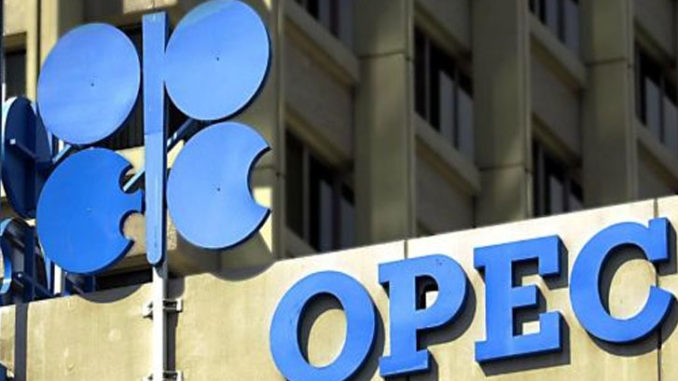
Barely a year after exiting recession, Nigeria’s fragile oil-dependent economy could soon be sliding back willy-nilly down the abyss of uncertainty; this time inspired by an oil production cut. For a country that has elevated oil to the status of lifeblood, any muddle in the oil market, including an output cap, leading to dwindling revenues, could spell serious trouble.
Following a shale-oil-inspired glut in the international market last year, and the concomitant drop in oil prices, the Organisation of Petroleum Exporting Countries, of which Nigeria is a member, decided to intensify output cuts as a means of shoring up prices. Unlike in previous instances when such decisions were barely acknowledged by non-OPEC members, there has been a generally enthusiastic embrace of the current output regulation, which has already produced an instant response of gradually rising prices.
Contrary to past arrangements when Nigeria was exempted, Africa’s leading oil producer will now be fully involved in the latest oil quota cut, which came into effect last month. It will deny Nigeria 53,000 barrels of oil per day from her daily output of 1.738 million barrels. But Saudi Arabia, the leading OPEC oil producer, with a cut of 322,000 bpd from its current massive daily production quota of 10.633 million bpd, will lead the way, just as Iraq, the second largest producer in OPEC, will see its 4.651 million bpd output cut by 141,000 bpd. The overall target is to remove 1.2 million bpd from OPEC’s market until June.
While this seems to be the most natural thing to do for most of the oil producing countries, Nigeria, as one of the most vulnerable members, has to think of how to cushion the effect on her finances. The country is faced with huge infrastructural gap, spiralling debt portfolio and an army of unemployed and restive youth and needs all the money she can muster. But if she cannot match her projected revenue target due to the production cap, the country’s expenditure plans will be up in the air.
This is why the cut remains cold comfort for Nigeria, from whichever prism it is viewed. The country has become so dependent on oil that when the prices started dipping in 2014, she started running into trouble, resulting in Nigeria’s first major recession in 25 years. Despite an attempt to claim the credit by some of the economic managers, it is obvious that the economy bounced back after five successive quarters of contraction owing in the main to the price rally late in 2017.
Nigeria’s budget for the 2019 fiscal year, awaiting the approval of the National Assembly, had been premised on a benchmark of $60 per barrel, but at a point in December last year, the prices dipped to $51 pb from $86.74 pb in October. Besides, Nigeria had the privilege of exemption from previous production cuts as a result of her troubled economy. Regrettably, she could not take full advantage of that reprieve because of the destruction of oil facilities by militants.
But, having emerged from recession with a marginal growth of 1.81 per cent, according to the National Bureau of Statistics, OPEC now considers it appropriate for Nigeria to make sacrifices. Aside from the budget benchmark of $60 pb, another key assumption of the budget was that oil production would peak at 2.3 million bpd, while calculations concerning the Economic Recovery and Growth Plan, a medium term all round development initiative of the government “focused on restoring growth, investing in people and building a globally competitive economy,” had also been based on oil production level of 2.4 million bpd.
It is important to note what President Muhammadu Buhari said at the budget presentation to the National Assembly. Aside from the $60 pb benchmark, he talked about an exchange rate of N305/$; real GDP growth of 3.01 per cent; and inflation rate of 9.98 per cent.” Disappointingly, these assumptions may have to be reviewed to reflect the current situation, which also means tougher times for the economy.
Producing a commodity in which she has no control over the price means Nigeria has to submit to the vagaries of market forces. Although the production cut is helping to rally prices, especially for the Brent that is comparable to Nigeria’s Bonny Light, which reached $64 on Monday, factors such as the slowdown in China’s economy and the United States sanctions on Venezuela, will go a long way in determining the effective implementation of Nigeria’s fiscal policies.
The trade war between China and the US, the two largest economies in the world, is definitely creating collateral damage to other economies. While America can produce enough oil to keep its industrial machinery running, China has to buy from others. So if the economy of a big buyer like China slows down, then the market will negatively feel the impact. That is what is happening now with the oil prices.
After reaching $64 pb, the highest in two months, oil prices have begun another downward drift. Nigeria should by now know that she cannot continue to rely on oil for planning. Aside from its volatility, the world is moving away from hydrocarbons and embracing a new era of clean or renewable energy that relies on the sun, wind, rain and tide, among other things. Gradually, vehicle manufacturing companies are coming up with deadlines for the phasing out of cars powered by diesel and petrol. The future belongs to electric cars. It is enough warning that the days of oil are numbered.
Nigeria has to diversify her economy by deploying sound policy measures to promote agricultural and industrial sectors. In fact, just like Norway, she should learn to insulate oil money from the economy. If this can be achieved, then oil money could be invested or used principally for infrastructure development. If, like Kuwait and UAE, for instance, Nigeria can invest in infrastructure, the country can also become an investment and tourist destination.
END

Be the first to comment